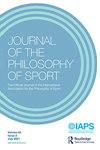Magnificent Utopian games
IF 1.7
3区 哲学
Q3 ETHICS
引用次数: 0
Abstract
ABSTRACT The Grasshopper’s game-playing Utopia collapses because, ideal though it might seem to some, ultimately most of us want more out of life than game-play. Building on both The Grasshopper and the published sequels in which Bernard Suits attempts to vindicate his Utopia, the current paper reconstructs Suits’s Utopia in a new way. I start from deeper reflection on Suits’s example of John Striver, a Utopian citizen who wants to work but whose profound boredom occasions Utopia’s collapse. Although the Grasshopper returns to Striver repeatedly and urges his interlocutors to bear him in mind, the case is underdeveloped and its implications undertheorized, both by Suits and his numerous commentators and critics. The Striver example reveals a picture of Utopian games as complex, dynamic, mutually responsive, and cooperative; such games are not only better for game-loving ‘Grasshoppers’ but make room in Utopia for work-loving ‘Ants’. This mutuality is the key to Utopia’s sustainability. The paper thus offers a new critique and reinterpretation of the central text in contemporary philosophy of sport and explicates the goods inherent in the ludic ideal.华丽的乌托邦游戏
摘要蚱蜢玩游戏的乌托邦之所以崩溃,是因为尽管在某些人看来很理想,但最终我们大多数人想要的生活比玩游戏更多。本文在《草蜢》和已出版的续集的基础上,以一种新的方式重建了西茨的乌托邦。我从更深入地思考Suits的例子开始,约翰·斯特雷尔是一个乌托邦公民,他想工作,但极度无聊导致乌托邦崩溃。尽管《蚱蜢》一再回到《奋斗者》,并敦促他的对话者记住他,但《诉讼》和他的众多评论家和批评者都认为,这起案件还不够成熟,其影响也不够深入。《奋斗者》的例子揭示了乌托邦游戏的复杂性、动态性、相互反应性和合作性;这样的游戏不仅对喜欢游戏的“蚱蜢”更好,而且在乌托邦为喜欢工作的“蚂蚁”腾出了空间。这种相互关系是乌托邦可持续发展的关键。因此,本文对当代体育哲学的中心文本进行了新的批判和重新解释,并阐释了荒诞理想中的内在产物。
本文章由计算机程序翻译,如有差异,请以英文原文为准。
求助全文
约1分钟内获得全文
求助全文
来源期刊

Journal of the Philosophy of Sport
Multiple-
CiteScore
1.90
自引率
14.30%
发文量
24
期刊介绍:
The Journal of the Philosophy of Sport (JPS) is the most respected medium for communicating contemporary philosophic thought with regard to sport. It contains stimulating articles, critical reviews of work completed, and philosophic discussions about the philosophy of sport. JPS is published twice a year for the International Association for the Philosophy of Sport; members receive it as part of their membership. To subscribe to either the print or e-version of JPS, press the Subscribe or Renew button at the top of this screen.
 求助内容:
求助内容: 应助结果提醒方式:
应助结果提醒方式:


